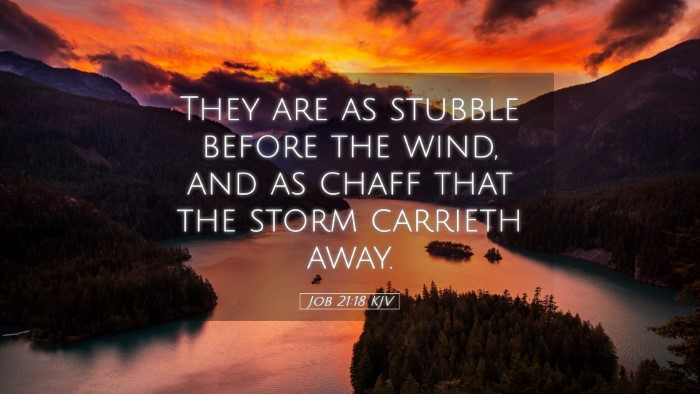Commentary on Job 21:18
Verse: "They are as stubble before the wind, and as chaff that the storm carrieth away."
Overview
In Job 21:18, we encounter a profound declaration made by Job during his discourse regarding the fate of the wicked compared to the righteous. This verse captures the essence of Job's argument against the traditional retributive theology that suggests the wicked always suffer in life, while the righteous are always rewarded.
Contextual Analysis
This verse arises in a context where Job challenges his friends' simplistic views of divine justice. His friends maintain that Job’s suffering must stem from personal sin, a perspective that Job vehemently rejects. He presents the example of the wicked who thrive and are seemingly free from immediate punishment.
Matthew Henry's Commentary
Matthew Henry offers insight into Job's rhetorical questioning by highlighting the reality of the wicked living prosperously. He states that though the wicked appear to flourish temporarily, they are in fact like stubble and chaff, which are light and easily destroyed by forces greater than themselves. Henry emphasizes that their apparent success is short-lived and ultimately leads to divine judgment.
Albert Barnes' Insights
Albert Barnes provides an analysis of the metaphors used in this verse. He explains that stubble refers to the refuse of harvested crops, signifying destruction, while chaff represents the worthless part of harvested grain that is blown away by the wind. Both terms illustrate the transient nature of the wicked's existence and the assured fate they will face when divine justice prevails. Barnes emphasizes that although they may escape judgment in the short term, their ultimate end is inevitable and disastrous.
Adam Clarke's Observations
Adam Clarke adds depth to the discussion by noting the ephemeral state of the wicked. He underscores that Job uses vivid imagery to convey the idea that those who oppose God are ultimately unyielding to His authority and are left with nothing of substance. Clarke points out that in the grand tapestry of God's creation, the fate of the wicked is analogous to chaff carried away by a storm—unsubstantial and incapable of resisting divine wind. His interpretation brings forth a sense of urgency and necessity for one’s relationship with God.
Theological Implications
The theological implications of Job 21:18 expand into the realms of justice, suffering, and the character of God. This verse challenges believers to consider the reality of evil's existence and raises questions about divine justice and its timing.
- Divine Justice: The verse confronts the notion that visible prosperity equates to righteousness, and that suffering indicates divine disfavor. The idea that God allows the wicked to prosper is a call for deeper understanding of His plans.
- Suffering of the Righteous: Job’s predicament and his observation about the fate of the wicked serve as a reminder that suffering does not define one’s character and relationship with God. This leads to the idea that suffering can have a divine purpose.
- The Nature of Temporality: The transient nature of earthly achievements and statuses is emphasized, promoting a view that encourages believers to fix their eyes on eternal values over temporal gains.
Applications for Today
This verse has profound applications in today’s context, especially for pastors, theologians, and students of the Bible.
- Counseling the Suffering: For those in ministry, this passage serves as a resource for counseling individuals who may feel abandoned or overwhelmed by their circumstances, reassuring them of God’s ultimate justice.
- Encouragement for the Discouraged: It provides encouragement to those living righteously but witnessing the apparent success of the unrighteous, reminding them that their reward is not earthly but eternal.
- Fostering a Biblical Understanding of Justice: This commentary can help foster deeper discussions on the nature of God’s justice, the nature of suffering, and the ultimate hope found in Christ.
Conclusion
Job 21:18 encapsulates the tension between observed reality and spiritual truth. Through the insights of notable commentators such as Matthew Henry, Albert Barnes, and Adam Clarke, we see that despite the wicked's temporary success, their fate is ultimately futile and fleeting. This verse invites us to look beyond the present circumstances and trust in God's sovereign plan that transcends time and earthly justice.


